I've always had a love-hate relationship with Ginataang Hipon. You see, I'm actually allergic to shrimp. But there's something about the way the creamy gata perfectly coats each hipon, releasing that intoxicating aroma of ginger, garlic and chilies that makes me throw caution to the wind.
Every time my Lola makes this dish, I find myself sneaking a piece (or three!) despite the inevitable itchy throat that follows. It's worth it every single time, that's just how irresistibly good this ginataang hipon recipe is.
This beloved Filipino comfort food is more than just shrimp in coconut milk, it's a dish that brings back memories of family lunches, where everyone fights over who gets to pour the rich, golden sauce over their steaming white rice.
Once you master this Ginataang Hipon recipe, it'll become your go-to dish for both weeknight dinners and special occasions. It only takes 35 minutes to make, but tastes like it's been simmering for hours in Lola's kitchen.
Jump to:
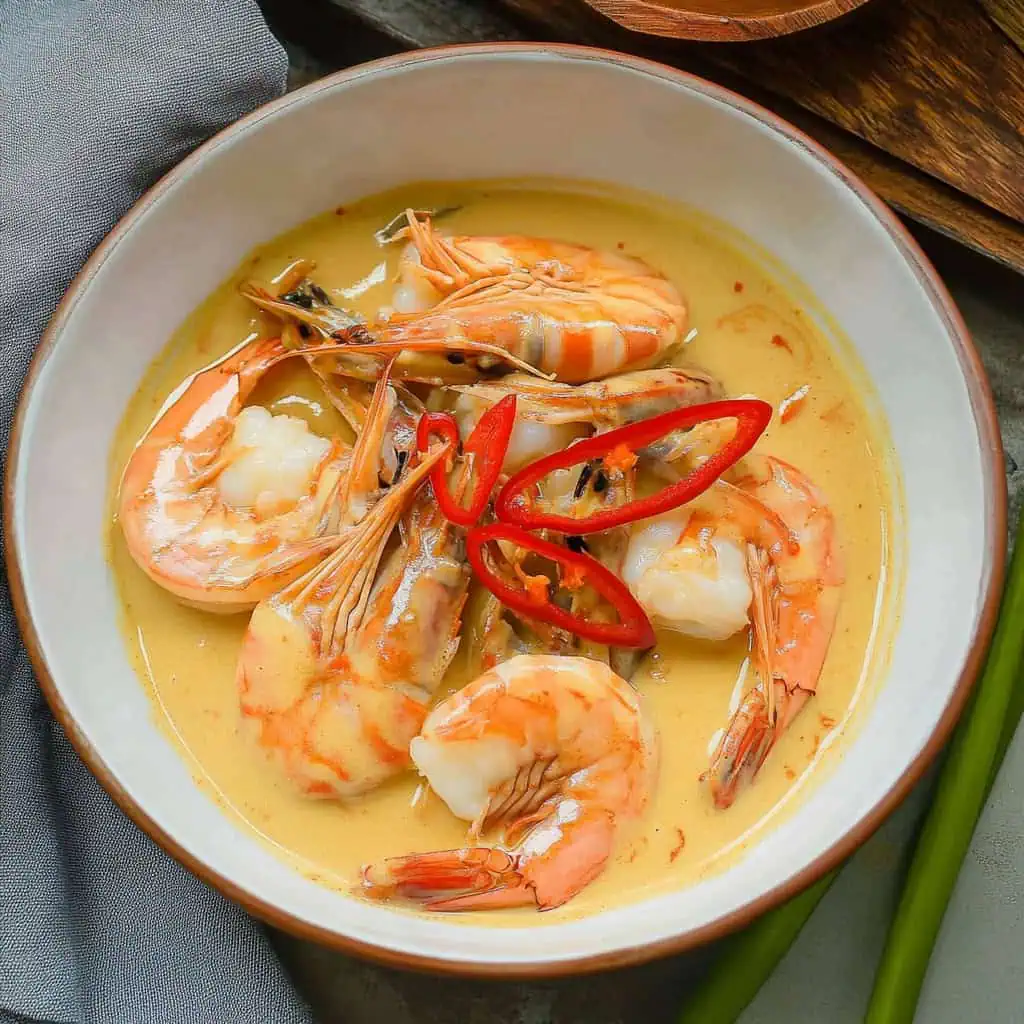
Why You'll Love This Recipe
- Rich and Creamy: The coconut milk creates a velvety sauce that perfectly coats each shrimp (hipon)
- Authentic Flavors: Traditional Filipino cooking method passed down through generations
- Quick Weeknight Meal: Ready in just 35 minutes while delivering restaurant-quality taste
- Versatile: Can be adjusted to your preferred spice level
- One-Pan Wonder: Minimal cleanup required
Ingredients
This Ginataang Hipon recipe features classic Filipino coastal ingredients that work together perfectly. Shrimp provides a sweet, delicate seafood base while coconut milk creates a rich, creamy sauce.
Ginger, garlic, and onions form an aromatic foundation that enhances the natural flavors. Fish sauce adds that essential umami depth that can't be achieved with just salt. The chilies bring a pleasant heat that balances the richness of the coconut milk.
Each ingredient plays a specific role: some build flavor, some add texture, and together they create a dish that's been perfected through generations of Filipino cooking. The balance of sweet, savory, spicy, and creamy makes this recipe irresistible.
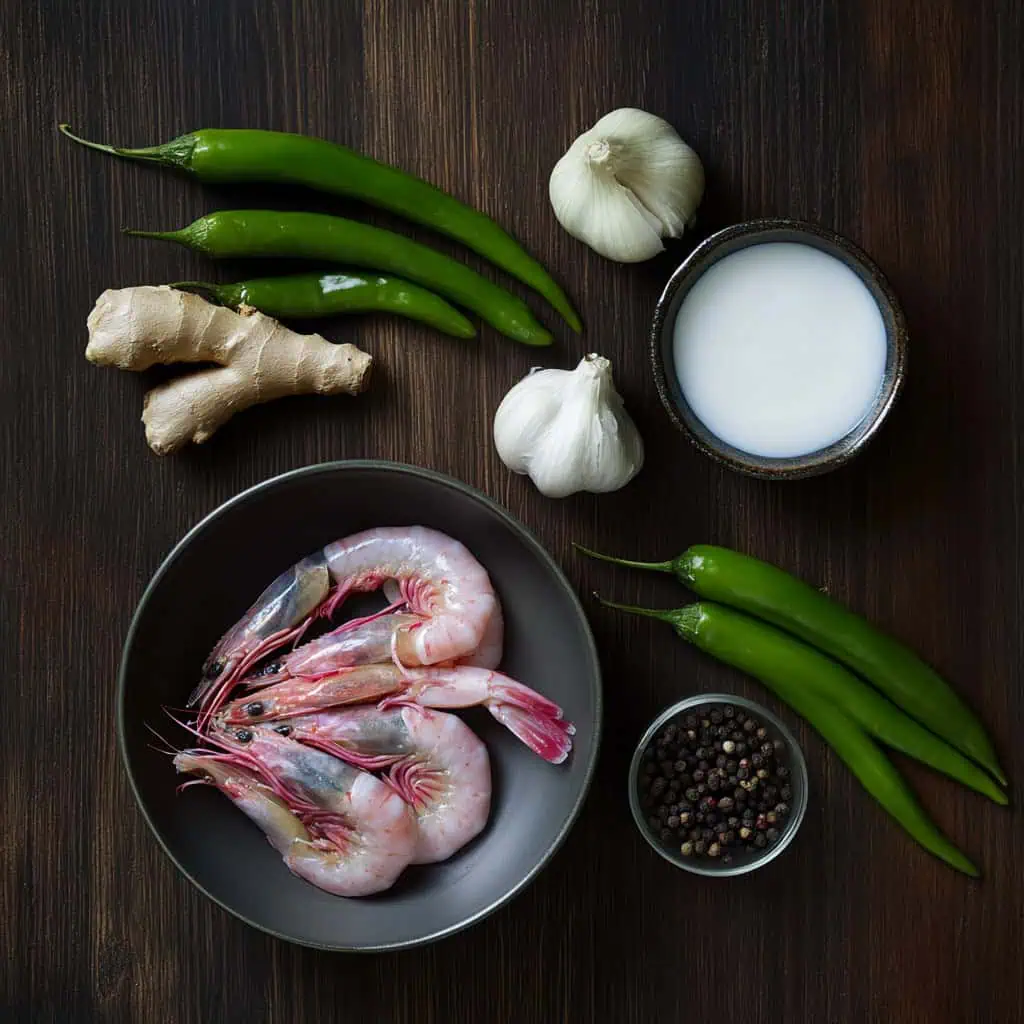
- 1 lb shrimp, cleaned and deveined
- 2 cups coconut milk
- 2 pieces long green chili, sliced
- 2 pieces long red chili or 6 pieces Thai chili, sliced
- 1 tablespoon ginger, minced
- 1 medium onion, chopped
- 3 teaspoons garlic, minced
- 1½ tablespoons fish sauce
- ⅓ teaspoon ground black pepper
- 2 tablespoons cooking oil
Equipment Needed
- Large deep skillet or wok: Essential for even heat distribution and proper sauce reduction
- Sharp knife: For precisely preparing aromatics like ginger, garlic, and chilies
- Wooden spoon: Allows for gentle stirring without scratching your cookware and maintains the integrity of the shrimp
- Measuring cups and spoons: Ensures accurate ingredient proportions for balanced flavor
- Colander: For properly cleaning and draining the shrimp before cooking

How To Make
- Heat cooking oil in a large skillet or wok over medium heat. Add the chopped onion and sauté until translucent, about 2-3 minutes.
- Add minced ginger and garlic. Cook until fragrant, stirring occasionally, about 1-2 minutes. Season with ground black pepper and fish sauce, then stir to combine.
- Pour in coconut milk and bring to a gentle boil over medium heat. Reduce heat to medium-low and simmer until the coconut milk reduces by half and the oil begins to separate from the liquid, about 20-25 minutes. You'll know it's ready when small oil droplets appear on the surface.
- Add cleaned and deveined shrimp to the reduced coconut milk. Cook until the shrimp turn pink and curl slightly, about 5-7 minutes. Do not overcook to maintain tender texture.
- Add the sliced chilies. Simmer for an additional 5 minutes until the chilies are slightly softened.
- Let rest for 2-3 minutes before serving to allow the sauce to thicken slightly. Serve hot with steamed white rice.

Tips from Lola's Kitchen
- Use fresh coconut milk whenever possible for the most authentic flavor profile
- Keep shrimp shells on during cooking for enhanced flavor, but remove heads unless you prefer to include them
- Watch the heat carefully when reducing coconut milk—too high and it will curdle, too low and it won't properly separate
- Look for the "latik" moment—when tiny golden oil droplets appear on the surface, signaling perfectly reduced coconut milk
- Fresh aromatics make a difference—freshly minced garlic and ginger create a more vibrant flavor base than pre-processed options
- Toast garlic slightly before adding other ingredients for a deeper, nuttier flavor profile
- Add chilies at the end of cooking to control their heat level and preserve their color
Substitutions
- Coconut Milk: Coconut cream diluted with water (use 1 part cream to 1 part water)
- Fresh Chilies: ½-1 teaspoon dried chili flakes or ¼-½ teaspoon cayenne powder
- Fish Sauce: 1 tablespoon soy sauce plus ¼ teaspoon salt, or simply 1 teaspoon salt
- Fresh Ginger: ½ teaspoon ground ginger (though fresh is strongly recommended)
- Shrimp: In a pinch, firm white fish pieces or squid can be substituted (adjust cooking time accordingly)
Troubleshooting
- Curdled Coconut Milk: Remove from heat immediately and whisk vigorously. For prevention, keep heat lower and stir constantly during reduction.
- Tough, Rubbery Shrimp: You've overcooked them. Next time, remove from heat as soon as shrimp turn pink and curl slightly.
- Too Spicy: Balance with additional coconut milk or serve with extra rice. For future batches, remove seeds from chilies before cooking.
- Watery Sauce: Continue simmering until desired consistency, or add 1 teaspoon of cornstarch mixed with 1 tablespoon water.
- Bland Flavor: Add an additional ½ tablespoon fish sauce and a pinch more black pepper.
Storage & Reheating
- Refrigeration: Store in an airtight container for up to 2 days. The flavor actually improves overnight as ingredients meld.
- Freezing: Not recommended as the coconut milk sauce will separate and the shrimp texture will suffer.
- Reheating: Use gentle heat in a covered pan, adding a splash of water or coconut milk if needed to restore creaminess. Stop heating as soon as warmed through to prevent overcooking the shrimp.

FAQ
Can I use frozen shrimp?
Yes, thaw completely and pat dry before cooking. Fresh is preferred for optimal flavor, but high-quality frozen shrimp work well.
How do I know when the coconut milk is properly reduced?
Small oil droplets will appear on the surface, and the sauce will coat the back of a spoon. The color changes from bright white to a slightly golden hue.
Can I make this dish less spicy?
Absolutely! Reduce or omit chilies according to your preference. You can also remove the seeds from the chilies for milder heat.
What size shrimp is best?
Medium to large (31/40 count) work best as they stand up to the cooking process without becoming tough. Jumbo shrimp can also be used for a more dramatic presentation.
Is this dish gluten-free?
Yes, traditional Ginataang Hipon is naturally gluten-free, but always check your fish sauce label to ensure no additives contain gluten.
What vegetables pair well with this dish?
Traditional additions include eggplant, string beans, moringa leaves, or squash. Add heartier vegetables earlier in the cooking process.
Can I use light coconut milk for a healthier version?
While possible, the dish won't develop the same rich sauce. If using light coconut milk, reduce the quantity by about 25% and expect a thinner consistency.
How spicy is this dish traditionally?
Moderate to spicy, but entirely adjustable to your preference. Filipino cuisine typically allows diners to adjust heat at the table with additional chili condiments.
Is it traditional to leave the shrimp shells on or off?
Many home cooks leave the shells on for added flavor, removing only the heads and veins. For easier eating, you can remove shells entirely.
Related
Looking for other recipes like this? Try these:
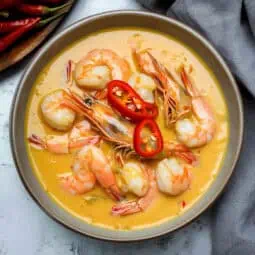
Ginataang Hipon (Filipino Coconut Milk Shrimp)
Equipment
- Large deep skillet or wok (kawali) For even heat distribution and sauce reduction
- Sharp knife (kutsilyo) For preparing aromatics
- Wooden spoon (sandok na kahoy) For gentle stirring without scratching the pan
- Measuring cups and spoons (Panukat) For precise ingredient portions
- Colander (salaan) For cleaning and draining shrimp
Ingredients
- 1 lb shrimp hipon, cleaned and deveined
- 2 cups coconut milk gata
- 2 pieces long green chili siling haba, sliced
- 2 pieces long red chili or 6 pieces Thai chili siling labuyo, sliced
- 1 tablespoon ginger luya, minced
- 1 medium onion sibuyas, chopped
- 3 teaspoons garlic bawang, minced
- 1½ tablespoons fish sauce patis
- ⅓ teaspoon ground black pepper paminta
- 2 tablespoons cooking oil mantika
Instructions
- Heat 2 tablespoons cooking oil (mantika) in a large skillet or wok (kawali) over medium heat (180°C/350°F). Add the chopped onion (sibuyas) and sauté until translucent, about 2-3 minutes.
- Add 1 tablespoon minced ginger (luya) and 3 teaspoons minced garlic (bawang). Cook until fragrant, stirring occasionally, about 1-2 minutes. Season with ⅓ teaspoon ground black pepper (paminta) and 1½ tablespoons fish sauce (patis), then stir to combine.
- Pour in 2 cups coconut milk (gata) and bring to a gentle boil over medium heat. Reduce heat to medium-low (150°C/300°F) and simmer until the coconut milk reduces by half and the oil begins to separate from the liquid, about 20-25 minutes. You'll know it's ready when small oil droplets appear on the surface.
- Add 1 lb cleaned and deveined shrimp (hipon) to the reduced coconut milk. Cook until the shrimp turn pink and curl slightly, about 5-7 minutes. Do not overcook to maintain tender texture.
- Add the sliced long green chilies (siling haba) and red chilies or Thai chilies (siling labuyo). Simmer for an additional 5 minutes until the chilies are slightly softened.
- Let rest for 2-3 minutes before serving to allow the sauce to thicken slightly. Serve hot with steamed white rice (kanin). For best results, keep the heat at medium-low when reducing the coconut milk to prevent curdling (pagbubuo-buo ng gata).
Tips from Lola's Kitchen
- Use fresh grated coconut milk (kakang gata) when possible for the best flavor
- Don't overcook the shrimp to maintain its tender texture
- Keep the heat medium-low when reducing coconut milk to prevent curdling
- Remove shrimp heads but keep shells for extra flavor
- Toast the garlic slightly for a nuttier flavor
Nutrition
The Story Behind Ginataang Hipon
In the coastal regions of the Philippines, where coconut trees sway along endless shorelines and fresh seafood arrives daily in fishermen's nets, Ginataang Hipon emerged as a natural celebration of local abundance. This dish exemplifies the Filipino cooking technique of "ginataan" - the art of cooking in coconut milk - which has been practiced in Philippine kitchens for generations before Spanish colonization.
The marriage of shrimp and coconut milk wasn't just a culinary choice, but a practical one. In coastal communities where both ingredients were plentiful, local cooks discovered that the sweet, briny flavor of fresh shrimp perfectly complemented the rich, creamy notes of coconut milk. The addition of ginger, garlic, and chilies - all native to Southeast Asian cuisine - created a dish that was both nourishing and deeply satisfying.
What makes Ginataang Hipon special is the technique of slowly reducing coconut milk until its oils separate, a method known locally as "paglalaga ng gata." This patient process transforms the coconut milk into a concentrated sauce that coats each shrimp with golden, flavorful goodness. It's this technique that sets apart a good Ginataang Hipon from an exceptional one, a secret passed down through generations of Filipino home cooks.
Today, this beloved dish appears on tables across the Philippines, from humble family meals to special occasions. While modern conveniences like canned coconut milk have made it more accessible to prepare, the heart of the dish remains unchanged - a testament to the enduring appeal of Philippine coastal cuisine and the timeless combination of seafood and gata.
Whether served in a modest home kitchen or a high-end Filipino restaurant, Ginataang Hipon continues to tell the story of Philippine culinary heritage, one creamy, shrimp-filled spoonful at a time.
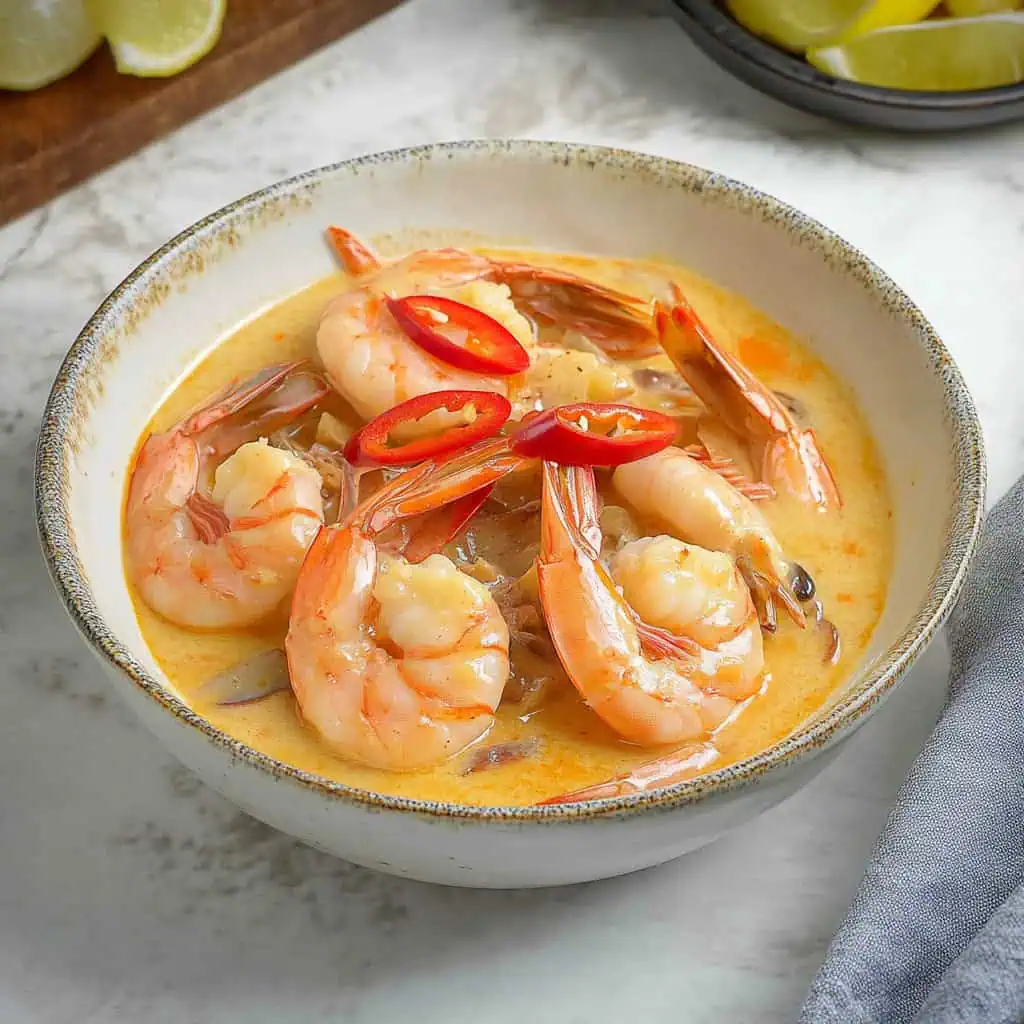

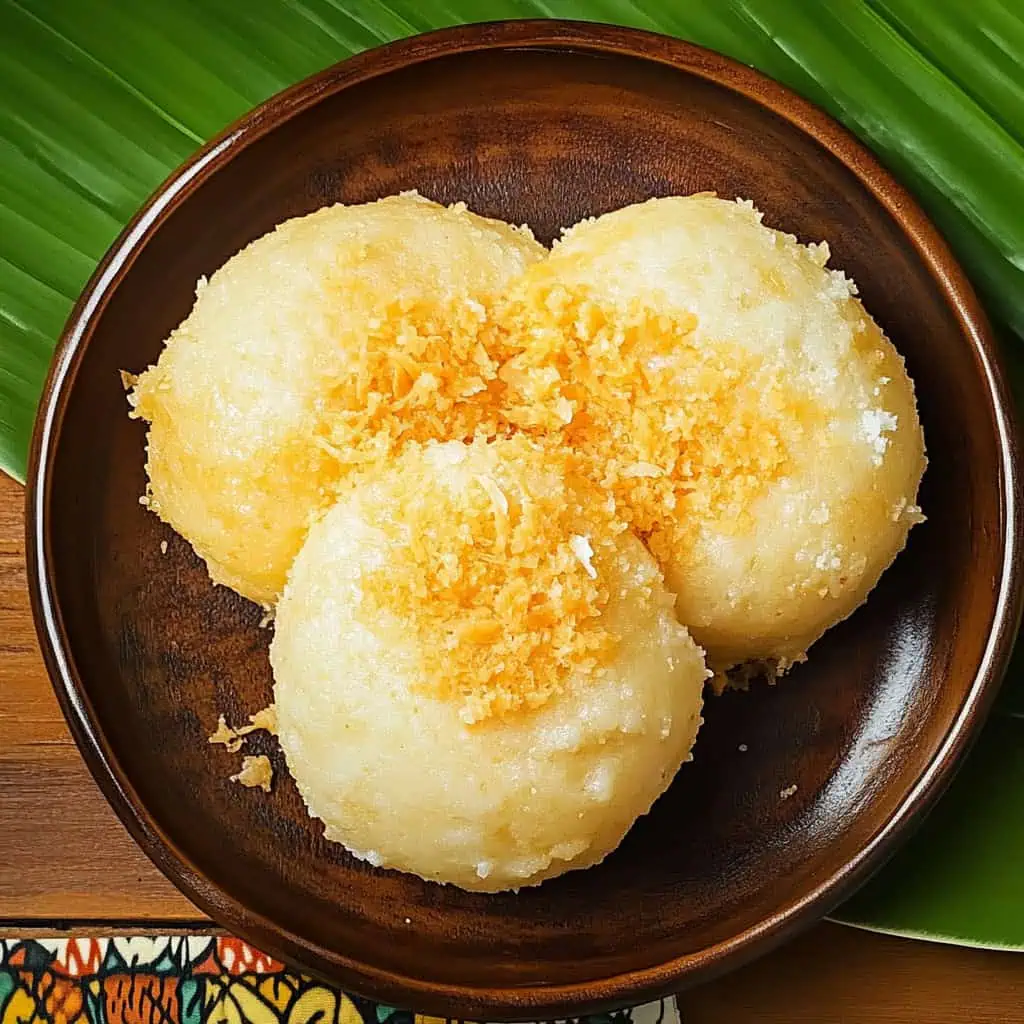
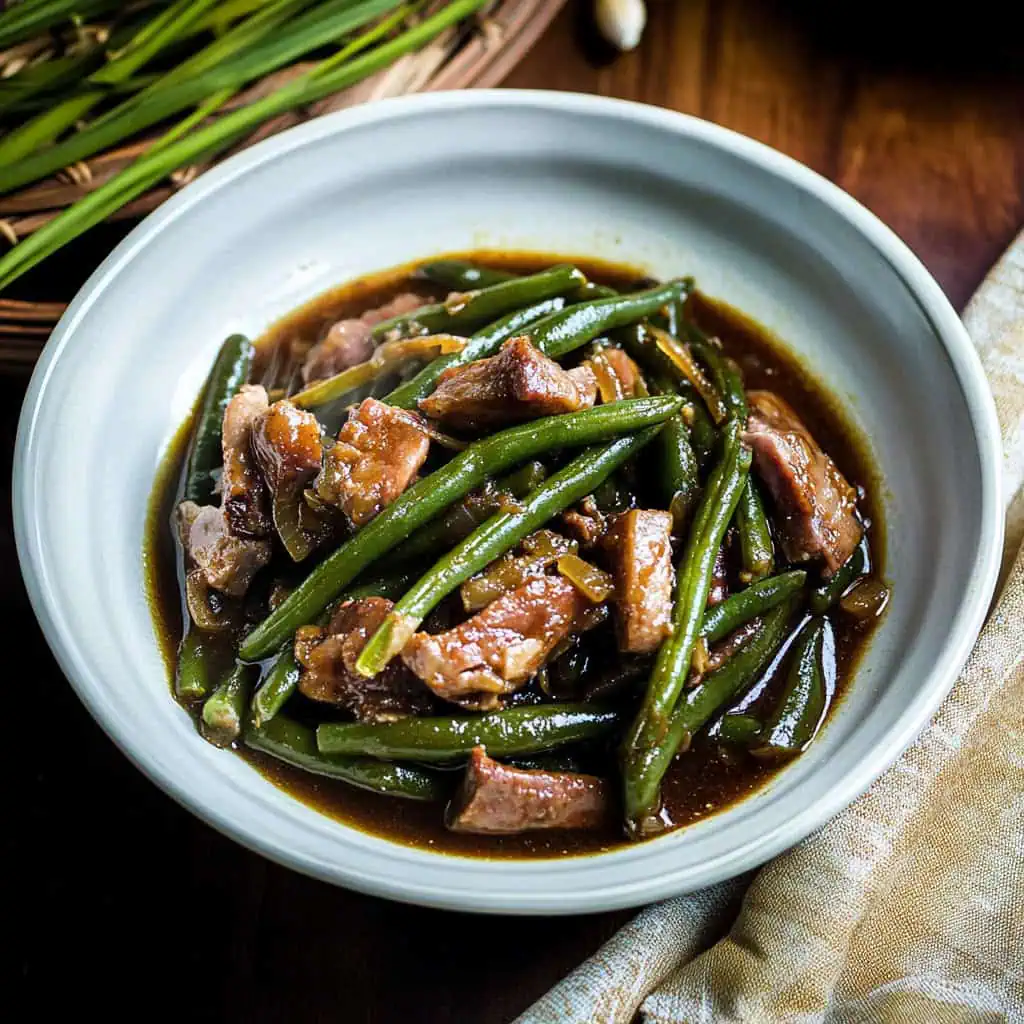
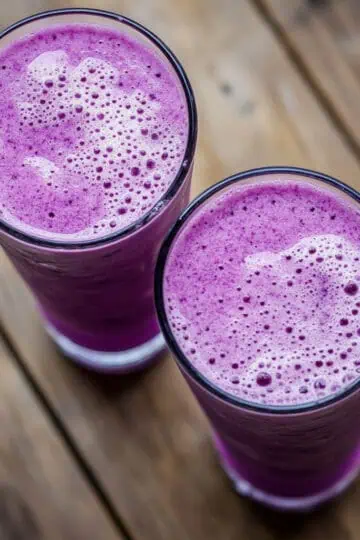
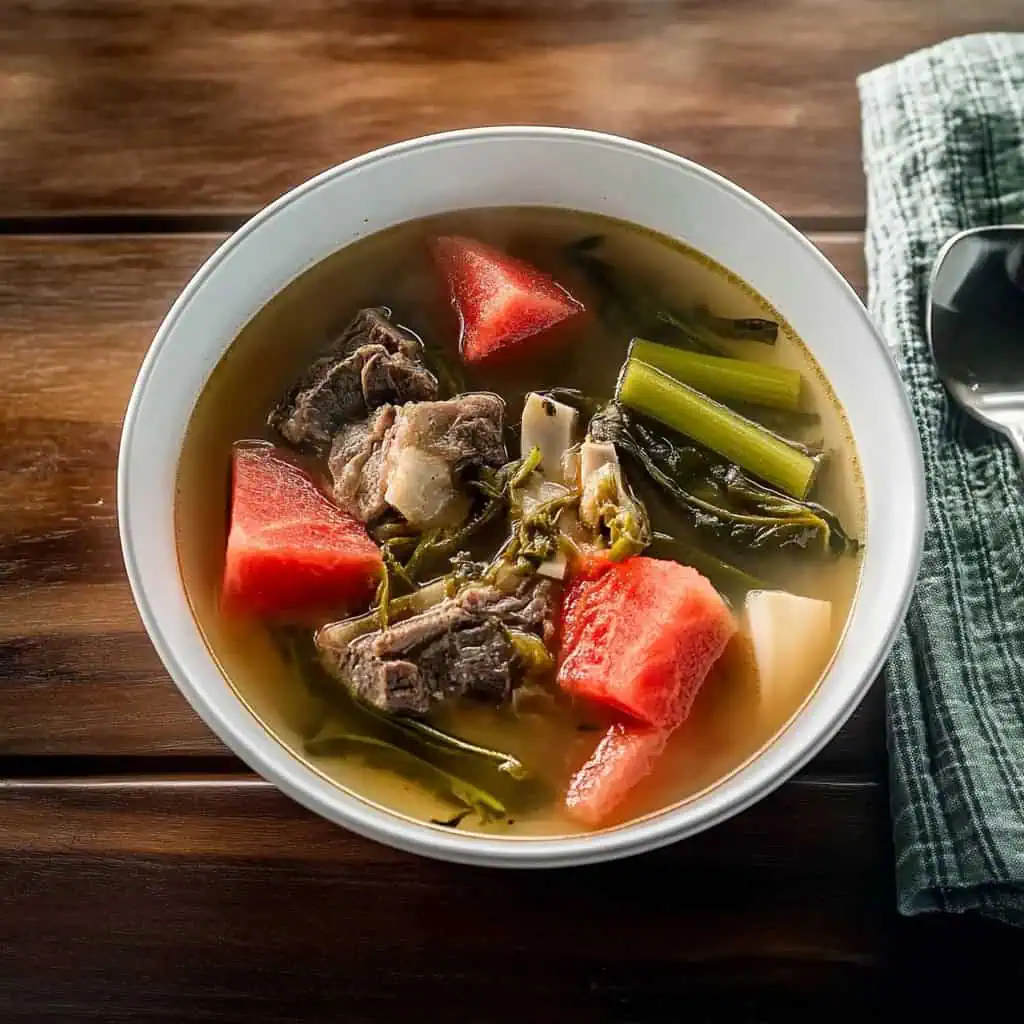
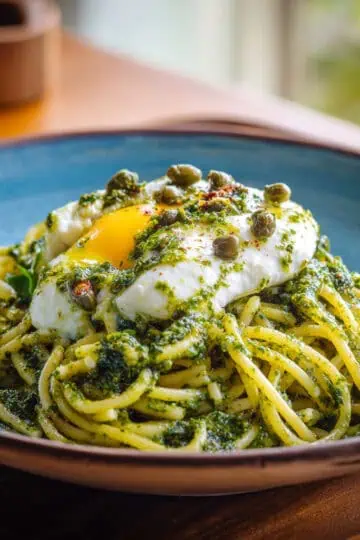
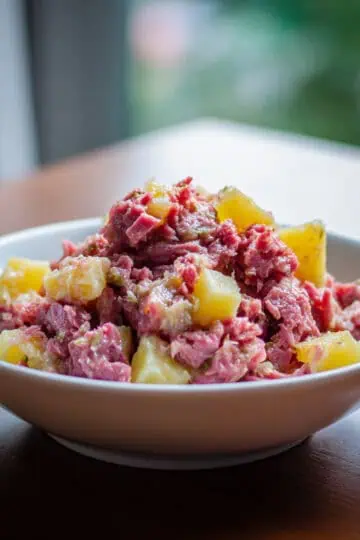

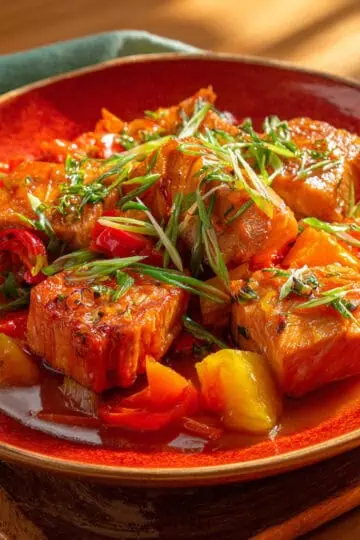
Comments
No Comments